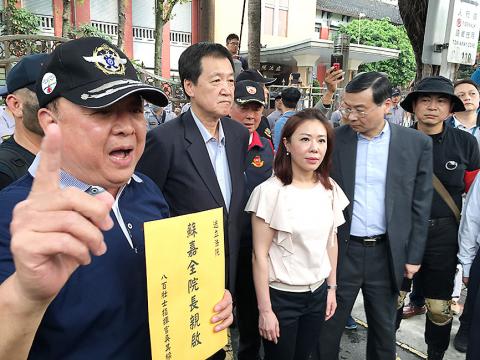As part of ongoing pension reform efforts, the Executive Yuan yesterday finalized draft amendments to the Act of Military Service for Officers and Noncommissioned Officers of the Armed Forces (陸海空軍軍官士官服役條例) that set the monthly minimum pension for retired military personnel at NT$38,990 and the timeframe for abolishing an 18 percent preferential interest rate on their savings accounts at 10 years after the amendments take effect.
The amendments stipulate that military pensions are to be calculated based on a “55+2” formula: 55 percent of double a service member’s base salary over the final five years of their service, which is to increase by 2 percent each year until reaching a maximum of 90 percent for officers or 95 percent for noncommissioned officers.
Retired military personnel who still benefit from the 18 percent preferential interest rate would see their interest earnings reduced if the sum of their pension and interest exceeds the total derived by the “55+2” rule, the draft amendments say.

Photo: Cheng Hung-ta, Taipei Times
The cut is to be implemented over a maximum of 10 years so that the sum of pension and interest matches the total to which retired military personnel are eligible to receive under the amended pension system.
The reform would not affect retired military personnel whose pensions are less than NT$38,990 or whose income replacement ratio is less than 55 percent, Minister Without Portfolio Lin Wan-yi (林萬億) told a news conference at the Executive Yuan in Taipei.
The new rules are expected to go into effect on July 1, along with pension cuts for public-school teachers and civil servants, after they pass a legislative review, he said.
The military pension reform would affect 56,312 — or about 48 percent — of retired military personnel, including 5,050 former noncommissioned officers, Veterans Affairs Council Deputy Minister Lu Chia-kai (呂嘉凱) said.
Separately yesterday, veterans group 800 Heroes commander Wu Chi-liang (吳其樑) and spokesman Wu Sz-huai (吳斯懷), who are both retired lieutenant generals, delivered another petition to the Legislative Yuan in Taipei, which was received by Legislative Yuan Deputy Secretary-General Kao Ming-chiu (高明秋).
The petition called for a constitutional interpretation of the proposed military pension reform to determine whether its scope should include retired military personnel who already receive pensions.
If the Council of Grand Justices finds the proposed reform constitutional, the group would end its opposition, Wu Sz-huai said, adding that otherwise, the proposed amendment should exclude existing pensioners.
The Cabinet’s proposal is not based on legitimate expectations, making it beneficial to active-service personnel, but harmful to former military personnel, Chinese Nationalist Party (KMT) caucus secretary-general Lee Yen-hsiu (李彥秀) said.
The Cabinet did not ensure sufficient communication before unveiling the draft, for which it was required to hold public hearings to better gauge the opinions of active and former military personnel before a review, she said.

CHAOS: Iranians took to the streets playing celebratory music after reports of Khamenei’s death on Saturday, while mourners also gathered in Tehran yesterday Iranian Supreme Leader Ayatollah Ali Khamenei was killed in a major attack on Iran launched by Israel and the US, throwing the future of the Islamic republic into doubt and raising the risk of regional instability. Iranian state television and the state-run IRNA news agency announced the 86-year-old’s death early yesterday. US President Donald Trump said it gave Iranians their “greatest chance” to “take back” their country. The announcements came after a joint US and Israeli aerial bombardment that targeted Iranian military and governmental sites. Trump said the “heavy and pinpoint bombing” would continue through the week or as long

TRUST: The KMT said it respected the US’ timing and considerations, and hoped it would continue to honor its commitments to helping Taiwan bolster its defenses and deterrence US President Donald Trump is delaying a multibillion-dollar arms sale to Taiwan to ensure his visit to Beijing is successful, a New York Times report said. The weapons sales package has stalled in the US Department of State, the report said, citing US officials it did not identify. The White House has told agencies not to push forward ahead of Trump’s meeting with Chinese President Xi Jinping (習近平), it said. The two last month held a phone call to discuss trade and geopolitical flashpoints ahead of the summit. Xi raised the Taiwan issue and urged the US to handle arms sales to

BIG SPENDERS: Foreign investors bought the most Taiwan equities since 2005, signaling confidence that an AI boom would continue to benefit chipmakers Taiwan Semiconductor Manufacturing Co’s (TSMC, 台積電) market capitalization swelled to US$2 trillion for the first time following a 4.25 percent rally in its American depositary receipts (ADR) overnight, putting the world’s biggest contract chipmaker sixth on the list of the world’s biggest companies by market capitalization, just behind Amazon.com Inc. The site CompaniesMarketcap.com ranked TSMC ahead of Saudi Aramco and Meta Platforms Inc. The Taiwanese company’s ADRs on Tuesday surged to US$385.75 on the New York Stock Exchange, as strong demand for artificial intelligence (AI) applications led to chip supply constraints and boost revenue growth to record-breaking levels. Each TSMC ADR represents

State-run CPC Corp, Taiwan (CPC, 台灣中油) yesterday said that it had confirmed on Saturday night with its liquefied natural gas (LNG) and crude oil suppliers that shipments are proceeding as scheduled and that domestic supplies remain unaffected. The CPC yesterday announced the gasoline and diesel prices will rise by NT$0.2 and NT$0.4 per liter, respectively, starting Monday, citing Middle East tensions and blizzards in the eastern United States. CPC also iterated it has been reducing the proportion of crude oil imports from the Middle East and diversifying its supply sources in the past few years in response to geopolitical risks, expanding